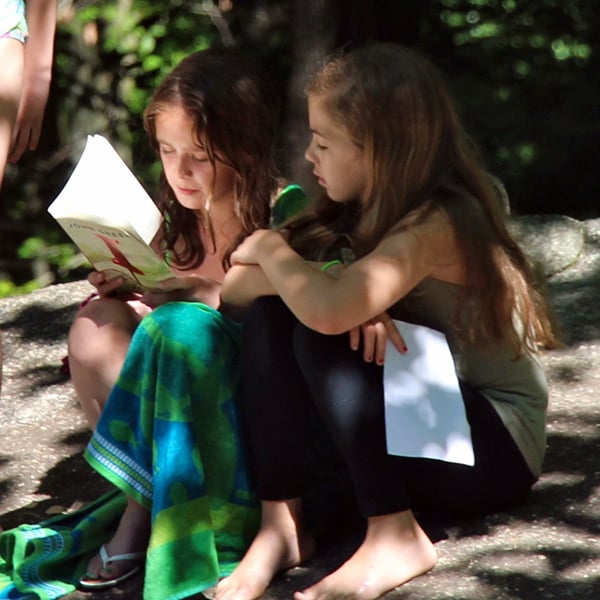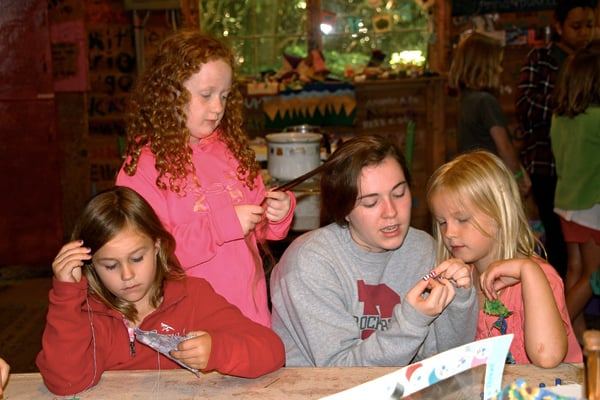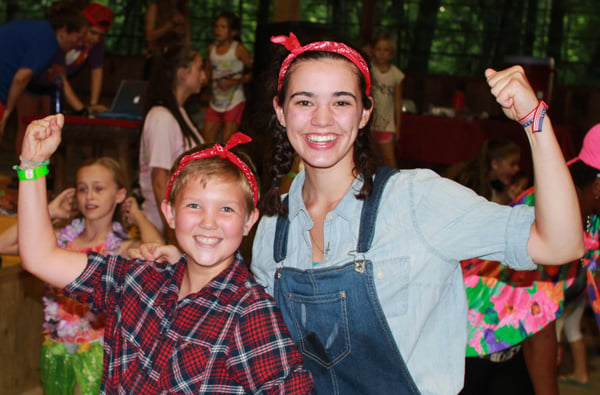When we finish a session at Rockbrook and the girls have returned home, we always send out a brief survey to parents hoping to receive some feedback about their girls’ time at camp. We ask questions about all aspects of the experience, from the activities, the health care, and the staff to the special events and the food. It’s always very interesting (and helpful!) to learn how camp succeeds and where we might improve the way we do things. Two of the final questions ask parents to describe the most challenging, and the most rewarding, aspect their girls encountered while at camp. I wanted to share an insight one parent mentioned in her response.
This parent reported her daughter being challenged by some of her cabin mates, “getting along with them,” but then suggested “being flexible and understanding others” was a clear reward as well. For this parent, and likewise for others I would guess, camp life for her daughter was not at first entirely comfortable and easy, but because of that, it provided very important lessons. To be an opportunity for growth, it was at first challenging in an beneficial way.
This is spot on. Being at summer camp, certainly the first time, means entering a foreign environment where the familiarity of home is replaced with all sorts of new experiences that can feel strange or even a little scary to a child. There’s unusual food… “Did you try the falafel?” There’s our mountain forest environment itself with its weird plants, perpetual parade of insects, eerie sounds at night and funky organic smells. At camp there are “never-tried-it” things to do like climb a real rock, improvise a character on stage, or knit a hat, for example, all which might appear “too hard” at first.
Camp, of course, is the perfect environment to try all these things, to go beyond the ordinary, and to learn what each requires. With the right combination of coaching and encouragement from our staff, girls will step “out of their comfort zone” and gain pillars of confidence that will support them in the future.
This parent comment, though, identified one of the most complex and equally inescapable aspects of camp life, and that which often requires the most adjustment for girls: the social dimension of the cabin. Camp cabins are made up of girls who might talk in their sleep, and others who might like waking up early. There may be a messy girl and a “neat freak” who have to share a bunk. Each cabin will undoubtedly be a mix of shy and outgoing girls, crafty and sporty girls, some voracious and others picky eaters. Working through all these differences, learning to be elastic when necessary, is simply part of cabin life. Most essentially, camp requires getting along with the other girls, getting to know them and finding ways to understand them. At Rockbrook, the cabin counselors, their training, personality and instincts, recognize this goal and work tirelessly to help everyone be more flexible. Everyone on the staff is keenly aware of this social dimension, sensitive to it, and ready to step in whenever a camper has trouble (or might subtlety be causing trouble!) in the cabin. For some groups, learning this elasticity can take time, but generally the girls understand its value and are quick to exercise it.
This is good stuff because this kind of social elasticity is a skill that really benefits children. After all, learning to adapt to various circumstances, making adjustments to others as needed, is the mark of a well-adjusted person who deals effectively with disappointment and is capable of creative problem solving. Throughout life there are situations when we are called upon to be flexible for a greater (often collective) good, so its important for our children to bank experiences where they have done so effectively. Again, with guidance from their counselors, life in the camp cabin provides exactly that.
Here’s a photo of a GaGa (or Ga-Ga) game. Sometimes called “Israeli dodge-ball,” or “Octo-Ball,” and literally translating as “touch-touch,” this is a form of dodgeball played inside an octagonal court made of 3-feet-tall walls. Any number of players and any aged-camper can play, making it a great camp game. During free time and sometimes during the Sports and Games activity, there are groups of campers eagerly playing. The games are fast-paced as players use their hands to knock the ball trying to hit other players in the leg. Once hit (or if she hits the ball out of the pit), a player is out. Like other forms of dodgeball, play continues until only one person remains. It’s even fun for girls after they are out and have to stand on the outside of the pit because they can still play in a way. They can lean into the pit trying to hit the ball, and if they successfully hit another person out, they get to return to the game. Game after game, the girls are really enjoying GaGa.
Finally, I can’t help but include this photo from our Twilight “Diva Dance Party” tonight. I was an hour of fun pop songs, costumes, and silly dancing… just your Rockbrook girls having a great time.







0 Comments
Comment section